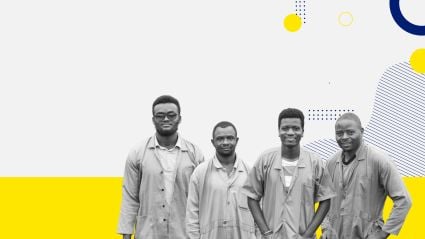
Pictured: Brian Ngetich, User-Centered Developer, FarmDirect.
Would you please tell us about your team and why you are passionate about AgriTech?
Producers Direct team is multicultural, multilingual, and multi-disciplinary. Our organization combines the experiences and expertise of people in Africa, Latin America, and Europe with different backgrounds but with one thing in common: We are all driven by empowering smallholder farmers to achieve their own vision. We have been working with a network of more than 1 million smallholder farmers since 2009, and we have used user-centered design to develop our AgriTech solution, FarmDirect. After all these years, we understand the importance of designing by farmers for farmers, so our solutions respond to smallholders’ actual needs. FarmDirect is holistic—so that it empowers farmers to overcome the multiple challenges they face with one platform, and inclusive—so that we reach farmers with the technology they have access to right now, designing for their reality so that it works within their particular context.
What inspired you to participate in the Milken-Motsepe Prize in AgriTech? In addition to competing for the $1 million grand prize, what do you hope to gain from this experience?
After many years of developing solutions by and for farmers, we understand the importance of networking and partnering with people and organizations who also develop solutions for this vulnerable group. It is an honor to be one of the finalists of the Milken-Motsepe Prize in AgriTech and be part of the discussions and sessions taking place as part of this prize (in meetings, along with educational and mentoring sessions). We are already learning from other teams and thinking about how we can sum our expertise to reach more smallholders better.
We are also sure that the Milken Institute's efforts to promote the AgriTech solutions developed by the finalists of this prize will be key to reaching more people interested in finding solutions to smallholders' challenges. We are excited about the doors this opportunity might open for us!
Would you briefly describe your concept and how it will increase economic value to farmers in Africa?
The world’s food supply chains are broken. Smallholders capture less than 5 percent of the total market value for their crops, women earn 50 percent less than men, and smallholder communities are aging as youth don’t see farming as viable businesses. The solution lies with the world’s over 1 billion smallholder farmers. Nevertheless, the lack of access to data, training, finance, and markets isn’t allowing them to become part of the solution.
One of the most exciting opportunities to overcome these challenges is harnessing the power of data and technology. We have created FarmDirect—a tool to deliver the Producers Direct suite of services digitally, accessible using even the most basic mobile phone—to put the power of technology and data into the hands of smallholders. FarmDirect is unique. It is designed by farmers for farmers, it is reaching farmers with their current technology and skills, and it is a holistic and inclusive solution.
What do you think sets you apart from other teams in this competition?
Having been raised in a farming community in the southern part of the Rift Valley in Kenya and being a farmer myself, I have always been passionate about agriculture and agricultural processes. I have also witnessed firsthand the problems that farmers face as they struggle to meet the world’s changing needs and the expectations of consumers, retailers, and regulators alike. I believe that if agriculture integrates technology, it will be revolutionized in many ways, and farmers will be more resilient to issues like climate change and global economic demands.
With my expertise in software development, I have employed a human-centered approach in the development of FarmDirect. My dream is to help smallholder farmers improve their livelihoods using accessible technology. In the long term, I wish to contribute to the efforts aimed at reducing post-harvest losses, inspiring youth to get into farming, educating farmers, and improving their access to markets.











